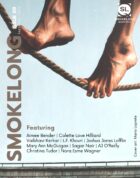I love the title of this essay—“The Promise.” Of course, we don’t know if this promise is kept or broken. Were you ever tempted to answer this, or was it important to you to leave this particular question unresolved?
The promise was broken. But I don’t think including that in the piece was necessary. The pen is only one of the many promises the father has broken. It’s also a reminder of the countless simple things the girl can’t count on having. In her world, hoping for anything is mostly futile. Her mother and her sister Irene reinforce that for her, not because they want to crush her spirit but because they want to spare her the disappointment they’re convinced will come. Irene warns her little sister not to get her hopes up, a warning that echoes her own familiarity with empty promises. Yet the narrator clings to the idea that her father will come through for her, just as she clings to his drunken, dreamlike prediction of what her little sailing ship can do, though that promise too may already be crushed.
The details of setting—the cold weather, the hot bus, the heavy coats, the Camel cigarettes, Dad’s unwashed undershirt—create an unsettling atmosphere. The young narrator here doesn’t ever seem comfortable; even when she encounters the beloved pen in the window, she has to move away from her own reflection. How did these details of setting emerge—were they inherently entwined with this particular memory, or did these images evolve along with the writing of the scenes?
The heavy coats and the stuffy bus ride were part of that day but they were also characteristic of winters in the Bronx. Likewise, the cigarette smoke and the unwashed shirt were not just part of that day but also synonymous with my father’s presence. The reflection in the window and the image of the father behind her were specific to the day itself, but the girl’s discomfort with her looks was an ongoing part of her self-image. The girl is able to defy the odds in hoping for better outcomes, but having to face the reality of her plainness makes that defiance much harder, so she steps away from the reflection.
In creative nonfiction, we have to treat those closest to us—including ourselves!—as characters on the page. As I read this essay, Irene stands out in her strength and specificity of characterization; the line, “But she was hard; Irene had no patience for fantasies” is especially striking. How do you approach writing close family members as characters, and how do you choose which features to exaggerate?
I take care not to exaggerate. I was the sixth of seven children, and the older siblings played a distinctive role in the family dynamic, each influencing my understanding of the world. When I write about them, I try to do so strictly from the POV of the child I was at that particular moment in time. Of course, I suspect my characterization of them is inevitably influenced by my knowledge of what happened to them before and after that moment. For example, a great deal of responsibility was placed on Irene at a very young age, compelling her to behave more like an adult than a child. The narrator in “The Promise,” despite the obstacles, retains an ability to imagine something special, e.g., writing her poems with that Parker pen. Irene doesn’t have that luxury.
Often in memoir writing, a memoirist will collide a memory from the past with reflection from the present. In this flash piece, we remain wholly in the past, and the voice is loyal to that of yourself as a child. Can you talk a bit about your decision to not include the narratorial, reflective voice of the present self in this piece?
I’ve employed the reflective voice in some memoir pieces, but often I find that when my “present self” enters the picture, events can get reinterpreted and their significance diluted. I strive instead to keep the blinders on and recreate the moment by conveying how the child experienced the events at the time—things she saw clearly, things she may have misunderstood. I believe the power of a memory (however flawed it may be) lies in that narrow focus—unembroidered by what the grown-up writer, in hindsight, thinks it all meant.



 The SmokeLong Grand Micro Contest (The Mikey) is now an annual competition celebrating and compensating the best micro fiction and nonfiction online.
The SmokeLong Grand Micro Contest (The Mikey) is now an annual competition celebrating and compensating the best micro fiction and nonfiction online.